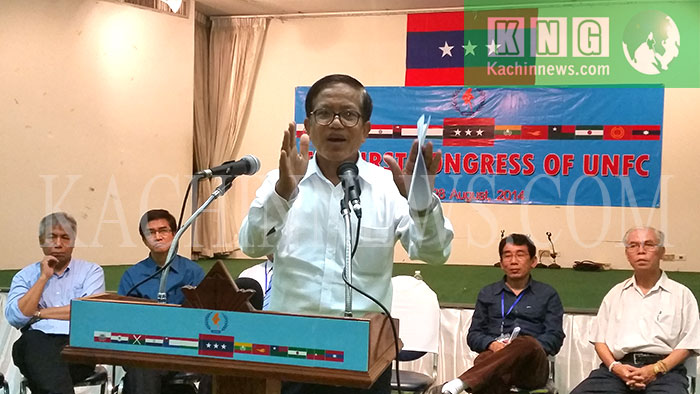The largest alliance of ethnic armed groups in Burma, the United Nationalities Federal Council (UNFC) claims that it has been able to clear up what the group characterized as a “misunderstanding” with officials in Naypyidaw about the group's policy.

This followed a round of meetings in the Burmese capital earlier this month by UNFC officials and their government counterparts. While in the capital the UNFC leaders met with the Union Peace Making Working Committee (UPWC), a group of elected members of parliament that is tasked with aiding the country's ongoing peace process.
The meeting was the first high level meeting the UNFC had with the representatives of the government since the head of the armed forces gave a speech before defense academy graduates in September criticizing the UNFC. Burma Army Commander-in-Chief Snr-Gen Min Aung Hlaing's comments in which he described the UNFC's stance as a hindrance to the peace process were widely reported in the Burmese press. The UNFC now says however that this was a misunderstanding which has seen been rectified according to a statement issued by the group on 15th November.
On 9th November the UPWC Vice-Chairman U Aung Min met with the three senior representatives from the UNFC. During the meeting the UNFC leaders explained the stance of their organization and its policy on the future political formation of the country, something that the UNFC says Snr-Gen Min Aung Hlaing misunderstood.
“They (the government) thought we ethnic armed groups have less desire for building a ceasefire and peace, they have a different view over the role of NCCT (Nationwide Ceasefire Coordination Team (NCCT) and the policy of the UNFC to form a Federal Army in the future, so we have to explain the real purpose of it,” said Nai Hong Sar, who serves as the UNFC's Vice Chairman.
Representatives from the Japan based Nippon foundation accompanied the UNFC leaders to Naypyidaw and Rangoon during their trip which lasted from the 9th to 13th of November.
The UNFC has adopted the goal of forming a Federal Army in the future to protect member groups, Nai Hong Sar says. This will also serve to bring unity among UNFC members, added Nai Hong Sar, who is a senior figure in the New Mon State Party (NMSP).
Nai Hong Sar explained that the Federal Army will prove useful in the future by helping the country become both a democracy and real federal union.
The UNFC's meetings in Naypyidaw were largely overshadowed by the ASEAN summit which was also held in the Burmese capital earlier this month. The statement added that the UNFC leaders used their visit to express the group's real intentions at a time when many diplomats are blaming the armed ethnic groups for delaying the nationwide peace process.
“We are not hardliners but trying to create real peace and on the other hand we want to express the will of ethnic people,” Naing Hong Sar said. “We want to reach the step of political dialogue as soon as possible after the nationwide ceasefire agreement,” he added.
There might be another meeting in November or perhaps early December between the NCCT and UPWC to discuss the text of the nationwide ceasefire agreement treaty and other agreements that have already been made, Nai Hong Sar added



